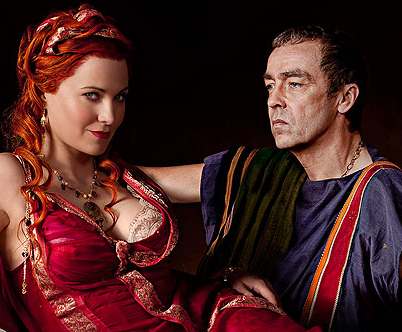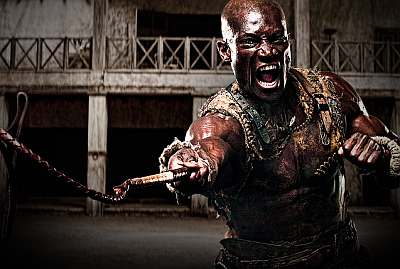Spartacus: Blood and Sand – Xena for adults…?
“Spartacus depicts extreme sensuality, brutality and language that some viewers may find objectionable. The show is a historical portrayal of ancient Roman society and the intensity of the content is to suggest an authentic representation of that period.”
— Pre-screening warning

Yeah, “suggest” would be the key word. For, historically, there’s little known about the man – he falls into the same category of neo-legendary characters as Robin Hood or King Arthur. This allows artists to portray him pretty much how they want, without much chance of being proven wrong. Said creator Steven S. DeKnight, “We take the Spartacus legend, we turn it on its side, and we beat the crap out of it” and added, “While we may bend history, we try to never break it. But I will always opt for what delivers the most dramatic impact over a strict adherence to historical fact.”
Hence the comparison of the title – a pretty loose description, but one that isn’t too far away from the truth. It’s set roughly around the same time, in the same part of the world, stars Lucy Lawless and also springs from the long-time collaboration between Rob Tapert and Sam Raimi, who produced this along with Joshua Donen. But the mythical and mystical aspects, of gods and monsters, are basically absent, in favour of a much more grounded approach. And the pre-broadcast warning is entirely justified: the blood flows in digital torrents, particularly during the gladiatorial battles, the nudity is copious, and the sex too, in just about every combination possible [though we need more lesbians…]
As you might have guessed, In centers on Spartacus (Andy Whitfield), a Thracian who leads a battalion of soldiers supposedly allied with the Romans. But when he ends up inciting a mutiny, he is condemned to die in the arena, and his wife becomes a slave. However, his execution ends up in the death of the four gladiators he faces, and he is sold to Batiatus (John Hannah), who runs one of the local troupes of arena performers, who sees possibilities in the new arrival. The rough edges are hewn to fine precision under the training of Doctore (Peter Mensah), but the rising fame of Spartacus makes him an enemy in current champion Crixus (Manu Bennett). Meanwhile, Batiatus and his wife Lucretia (Lawless) are angling to use Spartacus’s popularity to enhance their own standing with the local nobles, who currently despise the gladiator’s owner as beneath them.

It’s marvellously excessive soap-opera: perhaps its nearest cousin would be the WWE, with Hannah playing the role of Vince McMahon, manipulating those beneath him for his own ends, as they fight for the amusement of the masses. It’s really his show, perhaps more than Spartacus, with he and Lawless splendidly slimy and hedonistic, yet honourable on their own terms and deeply devoted to each other. It’s a bit of a shock to see the star of the Mummy films, or Four Weddings and a Funeral, dropping F-bombs and yelling “By Jupiter’s cock!” at people – though I feel life would be enhanced if we all used such colourful expletives in moments of stress. Similarly, Lawless shows a good deal more skin here than she ever did as Xena, and is wearing nicely into her forties.
In contrast, Whitfield is a little less memorable: the first episode is somewhat dull, until Batiatus shows up, and for the first half of the series, he is rather too single-minded, caring about nothing save being reunited with his wife. That’s how Batiatus gets him to agree to fight in the arena, by promising to re-unite Spartacus with his one true love. His master delivers – but in a twisted fashion that sets in motion the train of events which eventually hits the buffers in the final episode of the first season, with Spartacus’s rebellion kicking off in arterial fashion. I trust I am not spoiling this for anyone, since it’s historical fact. Whitfield does have his moments, not least when forced to battle his best-friend for the amusement of a teenage boy.
It is, however, the violence which really makes this stand out from the pack of historical TV series cluttering up the airwaves of late [hello, The Tudors]. It “glories in slaughter” (to borrow a quote from Dennis Healey about Mrs. T) in a way unmatched by any TV show I’ve ever seen, and only rarely reached by movies e.g. Shogun Assassin and Bad Taste, for my money going well past anything Eli Roth or other alleged “torture porn” directors have ever done. While it’s almost all CGI, the limb-lopping, blood-spatter and finishing moves worthy of Mortal Kombat (the game, of course) are done with deep affection and impressive style – why else bother having digital blood splashing on the camera lens?

Morally, you could certainly argue that there, the series is on dodgy ground. It portrays slaughter as entertainment, for our entertainment: the underlying feel is “Tsk, tsk – weren’t the Romans terrible people? Now, stay tuned, as we’re going to show you just how terrible they were…” But it’s just such unashamed fun to watch. Hannah and Lawless are superb, and it’s hard to see how the second series – commissioned before the first episode had even been screened – will be able to cope without one or perhaps both of them. Which as about as much as I can say without getting seriously spoilerish.
However, there may be bigger problems. Star Whitfield was diagnosed last month with Non-Hodgkin lymphoma, a form of cancer. It was caught early, and the prognosis for recovery is good, but it has already delayed filming, with discussion being directed towards a possible prequel series instead. That would be a shame, and I hope the disease is just another in the line of enemies soundly-defeated by our Spartacus. There’s nothing else like it on TV, and we’ll miss our weekly dose of ultraviolence until it returns.